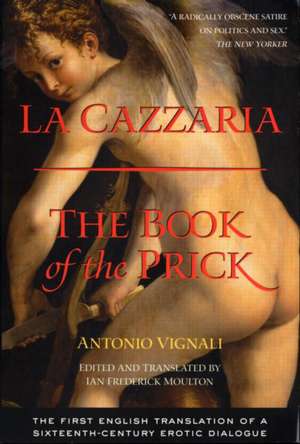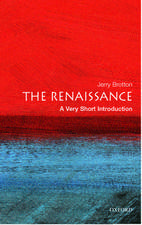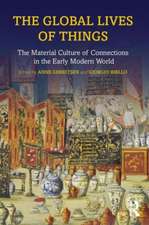La Cazzaria: The Book of the Prick
Autor Antonio Vignali Editat de Ian Frederick Moultonen Limba Engleză Paperback – 7 mar 2003
Preț: 294.93 lei
Preț vechi: 380.69 lei
-23% Nou
Puncte Express: 442
Preț estimativ în valută:
56.44€ • 59.12$ • 46.77£
56.44€ • 59.12$ • 46.77£
Carte tipărită la comandă
Livrare economică 09-23 aprilie
Preluare comenzi: 021 569.72.76
Specificații
ISBN-13: 9780415940672
ISBN-10: 0415940672
Pagini: 192
Dimensiuni: 138 x 216 x 12 mm
Greutate: 0.23 kg
Ediția:1
Editura: Taylor & Francis
Colecția Routledge
Locul publicării:Oxford, United Kingdom
ISBN-10: 0415940672
Pagini: 192
Dimensiuni: 138 x 216 x 12 mm
Greutate: 0.23 kg
Ediția:1
Editura: Taylor & Francis
Colecția Routledge
Locul publicării:Oxford, United Kingdom
Notă biografică
Antonio Vignali (1500-1559), also known as Arsiccio Intronato, was a writer from Sienna who died in political exile.Ian Frederick Moulton is Associate Professor of English at Arizona State University. He is author of Before Pornography: Erotic Writing in Early Modern England.
Recenzii
"The sexiest and most enjoyable book of the year." -- Dean Kuipers, LA Times
"Because it is such unabashed fun, it makes a sharp commentary on current writing about sex." -- Dean Kuipers, LA Times
"Controversy--political, sexual, and otherwise--always sells books... . Political intrigue and scandal are also the main topics in La Cazzaria: The Book of the Prick, by Antonio Vignali, edited and translated by Ian Frederick Moulton (Routledge; April). A cross between Machiavelli's The Prince and the most scandalous pornography of its time, this 16th-century " erotic dialogue "-- translated for the first time -- redefines the possibilities of sexual politics." -- Michael Bronski, Boston Phoenix
"Recommended for collections dealing with the history of sexuality or erotica." -- Mary Morgan Smith, Library Journal
"His [Mouton's] exemplary introduction is nearly as long as the text itself and twice as worthwhile. It provides the historical perspective and intellectual sobriety missing from what Moulton tactfully describes as 'learned, but childish,' fable that is, even by most liberal modern standards, a complete gross-out-though probably not to anyone who has tuned into Howard Stern. A radically obscene satire on politics and sex
." -- The New Yorkern
"His [Mouton's] exemplary introduction is nearly as long as the text itself and twice as worthwhile. It provides the historical perspective and intellectual sobriety missing from what Moulton tactfully describes as 'learned, but childish,' fable that is, even by most liberal modern standards, a complete gross-out-though probably not to anyone who has tuned into Howard Stern. A radically obscene satire on politics and sex
." -- The New Yorker
"Moulton's translation and edition of Vignali's La cazzaria constitutes a useful instrument to understand further the strong links among knowledge, power, and sexuality in the early modern period. Moulton's remarkable introduction to Vignali's dialogue places the text in its historical context, thus making this edition a useful instrument for scholars in gender studies, queer studies, and early modern political and intellectual history." -- Monica Calabritto, City University of New York, Hunter College, Renaissance Quarterly
"Moulton's translation and edition of Vignali's La cazzaria constitutes a useful intstrument to understand further the strong links among knowledge, power, and sexuality in the early modern period... a useful instrument for scholars in gender studies, queer studies, and early modern political and intellectual history." -- Monica Calabritto, the City University of New York, Hunter College, Renaissance Quarterly
"Because it is such unabashed fun, it makes a sharp commentary on current writing about sex." -- Dean Kuipers, LA Times
"Controversy--political, sexual, and otherwise--always sells books... . Political intrigue and scandal are also the main topics in La Cazzaria: The Book of the Prick, by Antonio Vignali, edited and translated by Ian Frederick Moulton (Routledge; April). A cross between Machiavelli's The Prince and the most scandalous pornography of its time, this 16th-century " erotic dialogue "-- translated for the first time -- redefines the possibilities of sexual politics." -- Michael Bronski, Boston Phoenix
"Recommended for collections dealing with the history of sexuality or erotica." -- Mary Morgan Smith, Library Journal
"His [Mouton's] exemplary introduction is nearly as long as the text itself and twice as worthwhile. It provides the historical perspective and intellectual sobriety missing from what Moulton tactfully describes as 'learned, but childish,' fable that is, even by most liberal modern standards, a complete gross-out-though probably not to anyone who has tuned into Howard Stern. A radically obscene satire on politics and sex
." -- The New Yorkern
"His [Mouton's] exemplary introduction is nearly as long as the text itself and twice as worthwhile. It provides the historical perspective and intellectual sobriety missing from what Moulton tactfully describes as 'learned, but childish,' fable that is, even by most liberal modern standards, a complete gross-out-though probably not to anyone who has tuned into Howard Stern. A radically obscene satire on politics and sex
." -- The New Yorker
"Moulton's translation and edition of Vignali's La cazzaria constitutes a useful instrument to understand further the strong links among knowledge, power, and sexuality in the early modern period. Moulton's remarkable introduction to Vignali's dialogue places the text in its historical context, thus making this edition a useful instrument for scholars in gender studies, queer studies, and early modern political and intellectual history." -- Monica Calabritto, City University of New York, Hunter College, Renaissance Quarterly
"Moulton's translation and edition of Vignali's La cazzaria constitutes a useful intstrument to understand further the strong links among knowledge, power, and sexuality in the early modern period... a useful instrument for scholars in gender studies, queer studies, and early modern political and intellectual history." -- Monica Calabritto, the City University of New York, Hunter College, Renaissance Quarterly
Cuprins
INTRODUCTION, Ian Frederick Moulton; Part 1 La Cazzaria; Chapter 1 La Cazzaria;










